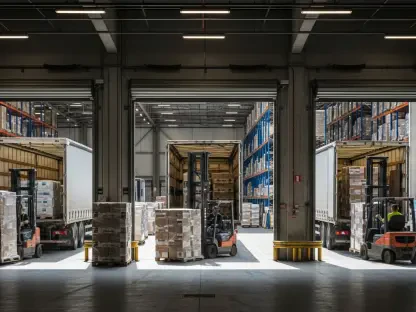The role of the logistics sector in the UK’s new industrial strategy cannot be overstated, as it serves as a cornerstone for the nation’s economic growth and development. This sector’s pivotal position is extensively discussed in the recently published “Invest 2035: The UK’s Modern Industrial Strategy.” This comprehensive 10-year plan aims to drive sustainable, inclusive, and resilient economic growth across various sectors. The logistics sector, with its immense contribution to productivity and efficiency, is emphasized by Michelle Gardner, Deputy Director of Policy at Logistics UK. She argues that logistics should be prioritized in the final version of the industrial strategy, which is scheduled for release in Spring 2025. This prioritization is critical given the sector’s ability to significantly impact other high-growth industries, making it an indispensable element of the nation’s economic framework.
Economic Impact and Productivity Gains
Gardner points out that the logistics sector is deeply intertwined with the broader economy, suggesting that strategically targeted investments and policy reforms could lead to substantial productivity gains. Specifically, she highlights projections that indicate potential annual productivity boosts of up to £7.9 billion by 2030. This impressive figure underscores the necessity for logistics to be included in pivotal decision-making bodies such as the Industrial Strategy Forum and the Industrial Strategy Council. By securing a place in these influential circles, the logistics sector can adequately steer critical policies related to infrastructure, innovation, skills development, regulatory reform, trade, and inward investment. The inclusion would allow logistics to leverage its strategic advantages, thereby maximizing its positive impact on the overall economy.
Furthermore, the green paper accompanying “Invest 2035” aims to create a conducive environment for attracting both international and domestic investments in strategically important sectors. By addressing existing barriers to growth and focusing on high-quality job creation, the industrial strategy seeks to make a meaningful impact across the UK. The government is actively soliciting feedback to refine and perfect this strategy before its official launch. This participatory approach indicates a commitment to building a supportive ecosystem capable of scaling up sectors that drive economic growth. In this context, the logistics sector’s potential to contribute significantly to economic stability and prosperity becomes even more evident.
Necessity for Stakeholder Engagement
The publication of “Invest 2035” embodies the government’s vision of fostering conditions that attract significant investments, thus fueling high-quality employment opportunities. This aligns with Gardner’s call for the logistics sector to assume a central role in the nation’s industrial strategy. Comprehensive engagement with stakeholders such as Logistics UK is essential to capture the full potential of the logistics sector. Such engagement will ensure that the sector’s strategic importance is recognized and incorporated into national economic policies. Gardner asserts that by neglecting the logistics sector, the UK risks sidelining a crucial component that can drive productivity and economic resilience across various industries.
Drawing from Gardner’s insights, the ultimate goal is to integrate logistics as a key pillar within the broader strategy, emphasizing its indispensable support role for other sectors. The logistics sector not only enhances productivity but also facilitates growth within other high-potential industries, thus acting as a multiplier for economic development. This symbiotic relationship between logistics and other sectors highlights the need for a stable and supportive environment that encourages investments and job creation. Such an approach lays the foundation for long-term economic prosperity and sustainability. The collaborative effort of including logistics in the strategy could bring about comprehensive economic benefits, driving the UK towards a more economically resilient future.
Conclusion
The “Invest 2035” initiative represents the government’s vision to create conditions that attract significant investments, thereby generating high-quality employment opportunities. This vision aligns with Gardner’s call for the logistics sector to take a central role in the nation’s industrial strategy. Comprehensive engagement with stakeholders, such as Logistics UK, is crucial to unlocking the full potential of the logistics sector. Such engagement will ensure that the sector’s strategic importance is acknowledged and integrated into national economic policies. Gardner warns that ignoring the logistics sector puts the UK at risk of neglecting a vital component that boosts productivity and economic resilience across multiple industries.
Gardner’s insights emphasize the need to make logistics a key pillar within the broader strategy, underscoring its crucial support for other sectors. The logistics sector not only boosts productivity but also promotes growth in high-potential industries, acting as an economic multiplier. This symbiotic relationship calls for a stable and supportive environment to foster investments and job creation. Such an approach paves the way for long-term economic prosperity and sustainability. By including logistics in the strategy, the UK can achieve comprehensive economic benefits, steering towards a more resilient future.









